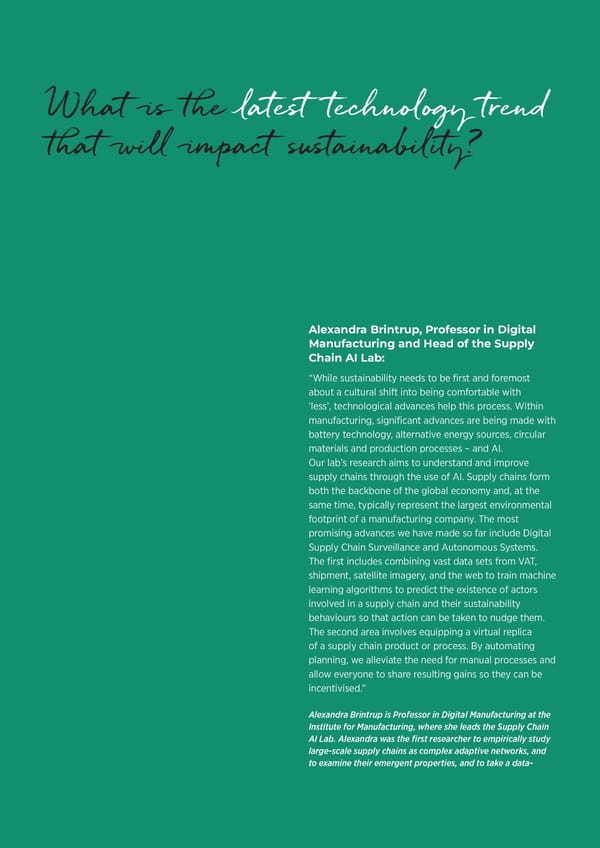SUSTAINABILITY SPOTLIGHT | 25 Technology perspectives What is 琀栀e latest technology trend 琀栀at wi氀氀 impact sustainability? Jagjit Singh Srai, Director of Research, Alexandra Brintrup, Professor in Digital and Head of the Centre for International Manufacturing and Head of the Supply Manufacturing Chain AI Lab: “Long-term technological trends show that advanced “While sustainability needs to be 昀椀rst and foremost manufacturing technologies can create innovative about a cultural shift into being comfortable with product designs by utilising new production methods. ‘less’, technological advances help this process. Within This holds great promise in terms of resource e昀케ciency. manufacturing, signi昀椀cant advances are being made with These advanced manufacturing technologies often battery technology, alternative energy sources, circular involve less aggressive processing, making them both materials and production processes – and AI. energy- and material-e昀케cient. Other technologies that Our lab’s research aims to understand and improve cover a broad spectrum of digital tools, such as AI, supply chains through the use of AI. Supply chains form blockchain and others, will enable us to gain visibility both the backbone of the global economy and, at the into demand and supply in our supply chain, allowing us same time, typically represent the largest environmental to synchronise them more e昀昀ectively. This, in turn, helps footprint of a manufacturing company. The most us to minimise waste and meet demand in the most promising advances we have made so far include Digital e昀케cient manner. Supply Chain Surveillance and Autonomous Systems. The 昀椀rst includes combining vast data sets from VAT, “Our latest research has involved the development of shipment, satellite imagery, and the web to train machine sustainable supply chain assessment tools, renewable learning algorithms to predict the existence of actors feedstock and by-product supply chain design involved in a supply chain and their sustainability frameworks, and the con昀椀guration of circular supply behaviours so that action can be taken to nudge them. chain models, spanning network design and data-driven The second area involves equipping a virtual replica modelling.” of a supply chain product or process. By automating planning, we alleviate the need for manual processes and Jag has extensive experience leading large-scale complex allow everyone to share resulting gains so they can be research projects comprising multiple stakeholders incentivised.” across industry, academia and public bodies. His research centre brings an engineering and strategic operations Alexandra Brintrup is Professor in Digital Manufacturing at the management perspective to the design, analysis and Institute for Manufacturing, where she leads the Supply Chain operation of international supply chains and the impact of AI Lab. Alexandra was the 昀椀rst researcher to empirically study advanced production and digital technologies. Through large-scale supply chains as complex adaptive networks, and major collaborations with industry (individual 昀椀rms and to examine their emergent properties, and to take a data- consortia), primarily in the healthcare and food/FMCG driven perspective to characterise their resilience, which led to sectors, his research 昀椀ndings have directly underpinned major understanding universal patterns that govern supply chains. organisational change.
 Sustainability Spotlight Magazine Page 24 Page 26
Sustainability Spotlight Magazine Page 24 Page 26